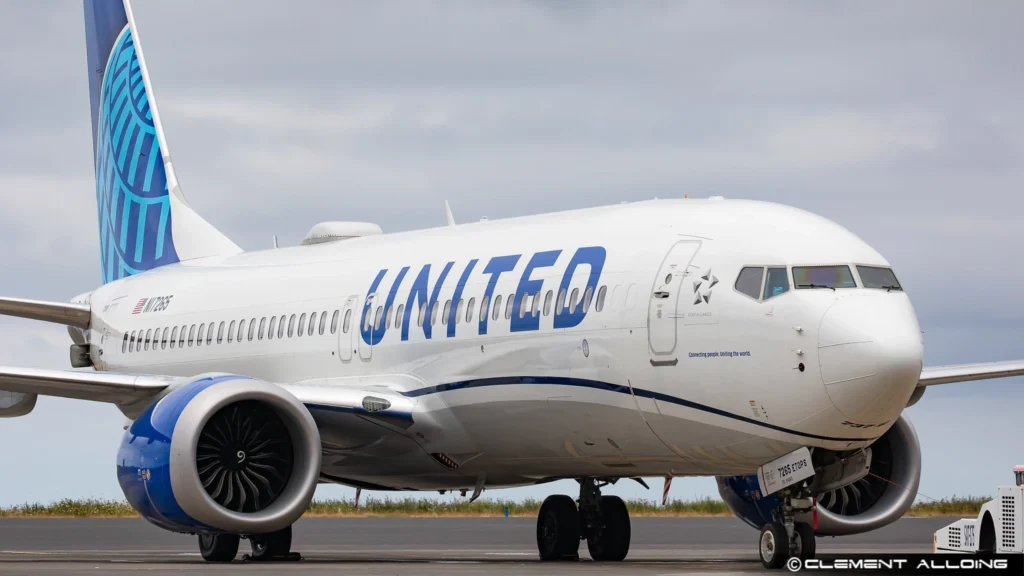
CHICAGO- A United Airlines (UA) Boeing 737 MAX 9 encountered an unusual incident during takeoff when its landing gear struck a coyote, an American wolf. The flight from Chicago O’Hare (ORD) to Phoenix (PHX) safely returned to Chicago with no injuries reported.
This occurrence highlights the ongoing challenges of wildlife strikes in aviation, an issue faced globally by airlines and airports. United Airlines swiftly arranged alternate transportation for passengers, ensuring minimal disruption.
 Photo: Andrew E. Cohen | Flickr
Photo: Andrew E. Cohen | FlickrUnited Airlines Struck By Coyote
United Airlines (UA) Flight UA1727 departed from Chicago O’Hare International Airport (ORD) at approximately 10:45 AM with 167 passengers and six crew members.
During takeoff, the landing gear struck a coyote, prompting the pilots to return the aircraft for a precautionary inspection.
The Boeing 737 MAX 9 landed safely, and passengers were later accommodated on another aircraft to continue their journey to Phoenix Sky Harbor International Airport (PHX).
United Airlines handled the situation with efficiency, prioritizing passenger safety and ensuring timely alternate arrangements.
The airline confirmed the event but did not release additional details about the coyote strike or subsequent aircraft examination.
Wildlife strikes, particularly involving birds, pose a persistent threat to the aviation industry. The incident involving United Airlines Flight UA1727 underscores the risks associated with terrestrial animals like coyotes.
 Photo: Duncan Kirk | https://www.flickr.com/photos/182528221@N07/
Photo: Duncan Kirk | https://www.flickr.com/photos/182528221@N07/Wildlife Strike Prevention
According to the Federal Aviation Administration (FAA), the U.S. has recorded over 310,000 wildlife strikes involving civil aircraft between 1990 and 2023.
The majority of these involve birds, while incidents with terrestrial animals, including deer, rabbits, and coyotes, are less frequent but can cause significant damage.
Coyotes alone accounted for 824 reported strikes between 1990 and 2022, based on data from the U.S. Department of Agriculture. Their adaptability to various environments, including areas surrounding airports, increases the likelihood of such encounters.
Airports implement numerous strategies to mitigate wildlife hazards, including habitat modification, wildlife control measures, and the use of technology to detect animal presence. Despite these efforts, wildlife strikes remain a complex issue requiring ongoing vigilance.
Chicago O’Hare International Airport, one of the busiest in the world, is equipped with a wildlife management program aimed at minimizing such risks.
Nevertheless, incidents like the United Airlines Flight 1727 coyote strike highlight the unpredictability of wildlife behavior and the need for continual innovation in mitigation efforts.
 Photo: Clément Alloing
Photo: Clément AlloingBottom Line
This incident serves as a reminder of the aviation industry’s ongoing challenges with wildlife strikes.
While safety protocols and management systems are effective in preventing most accidents, rare events like terrestrial animal strikes underscore the importance of ongoing research and adaptation to emerging risks.
Stay tuned with us. Further, follow us on social media for the latest updates.
Join us on Telegram Group for the Latest Aviation Updates. Subsequently, follow us on Google News
United Airlines Boeing 777 Experience Engine Failure Mid-Air, Diverted to Atlanta
The post United Airlines 737 MAX Struck By Coyote, Flight Returns to Chicago appeared first on Aviation A2Z.

 11 miesięcy temu
11 miesięcy temu